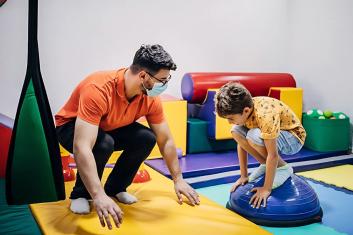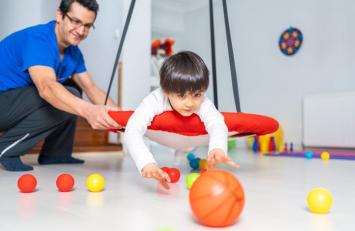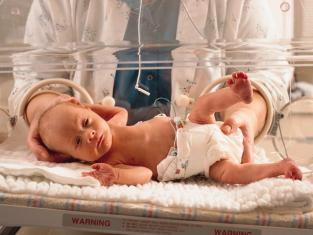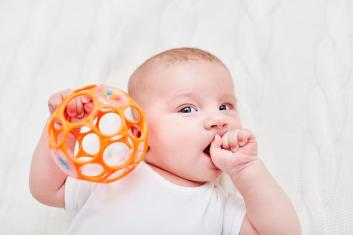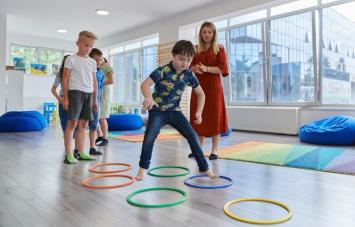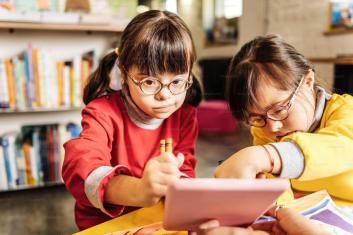Children should be referred if they show signs of delayed milestones, muscle weakness, difficulty with movement, or after neurological injuries.

Mr. Mohan Dass G
Paediatric Physiotherapist and Ph.D. Research Scholar
BPT, MPT - Masters in Physiotherapy (Neurosciences), Ph.D Research scholar

About Mr. Mohan Dass G
Mr. Mohan Dass G is a highly skilled Pediatric Physiotherapist specializing in early intervention rehabilitation for high-risk infants. With extensive training and certification in advanced developmental assessment tools and therapeutic techniques, he focuses on identifying and addressing neurological and motor development concerns in neonates and infants admitted to the NICU. His expertise includes evaluating developmental progress across multiple domains such as gross motor, fine motor, cognitive, and behavioral milestones during the critical first two years of life.Mr. Mohan Dass G is dedicated to providing targeted, evidence-based interventions to promote optimal neurodevelopmental outcomes in vulnerable infant populations.
Mr. Mohan Dass G specializes in early identification and intervention for infants at high risk of developmental delays, particularly those with neurological challenges stemming from preterm birth or NICU admission. He is proficient in utilizing advanced assessment tools, including Prechtl’s General Movement Assessment, TIMP, DASII-2, and Bayley Scales, to accurately evaluate the developmental status of infants. His therapeutic approach incorporates specialized techniques such as Movement Imitation Therapy, Dynamic Movement Intervention, and Total Motion Release to facilitate normal movement patterns, improve posture, and enhance overall motor and cognitive development. Committed to improving neurodevelopmental outcomes, Mr. Mohan Dass G continually updates his skills and holds certifications from renowned international institutions to ensure the delivery of comprehensive, multisystemic early intervention care.
Mr. Mohan Dass G 's Areas of expertise
Pediatric Physiotherapy & Rehabilitation: Specialized physiotherapy aimed at improving motor skills, movement, and overall development in children with various disabilities or delays. Focuses on personalized therapy plans to enhance functional independence and quality of life.
High risk infant screening (HIE, RDS, LBW, Preterm): Involves early detection and assessment of high-risk newborns such as those with Hypoxic-Ischemic Encephalopathy (HIE), Respiratory Distress Syndrome (RDS), Low Birth Weight (LBW), or preterm birth. Ensures timely intervention for optimal developmental outcomes.
Developmental Assessment & Management: Comprehensive evaluation of a child's developmental milestones and motor functions to identify delays or abnormalities. Implements targeted physiotherapy strategies to support and optimize developmental progress.
Respiratory, Pulmonology & Neuromuscular Physiotherapy: Provides specialized therapy techniques to improve breathing, manage respiratory conditions, and enhance neuromuscular function in children with lung or nerve-related issues. Only Pediatric respiratory therapist in India who has wide knowledge on “cough assist therapy” has trained and provide cough assist therapy to various ICU team, Critical care units around Bangalore as well throughout India.
Physiotherapy for Learning Disabilities: Therapeutic interventions aimed at improving coordination, motor planning, and sensory processing in children with learning disabilities. Supports overall developmental and functional skills improvement.
Resource person activities:
State level physiotherapy in critical care unit – January 2025 Hands on workshop at R L Jalappa college of physiotherapy, SDUAHER, Kolar
Paediatric Pulmonology module – 2023& 2024 “Resource person for Paediatric pulmonary rehabilitation – Chest physiotherapy (Airway clearance techniques, mechanical insufflation and exsufflation device - MI: E Cough assist therapy) at Manipal Hospitals, Old Airport Road, Bengaluru
Functional Vision restoration at CAPAAR, Nobel Residency Road, Bengaluru
Research publications :
1.Clinical profile and outcomes of children using mechanical Insufflation and Exsufflation device (cough assist) at a tertiary care hospital in Bengaluru, India Journal of Pediatric pulmonology, 2024.
2.Hand grip strengthening exercises on fine motor skills in children with autism spectrum disorder , Polish journal of physiotherapy , 2023.
3.Motor impairments in autism spectrum disorder – critical review at 25th edition international disabled peoples day, zgorzelec, Poland.
Awards & Honors:
Mr. Mohan Dass G was “Resource Person” at 15th Annual Bangalore Physiotherapy Network Conference, BPN COLLOQUIUM 2025 ,BAR CAMP - Peer Learning Session on “Mechanical Insufflation Exsufflation therapy MI:E therapy” (Cough assist therapy ) among enthusiastic physiotherapy participants
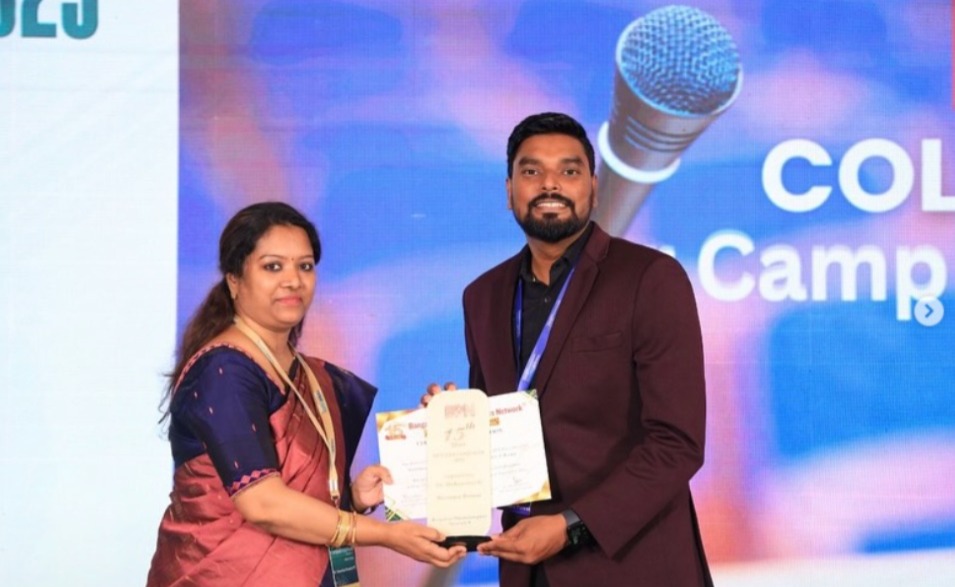
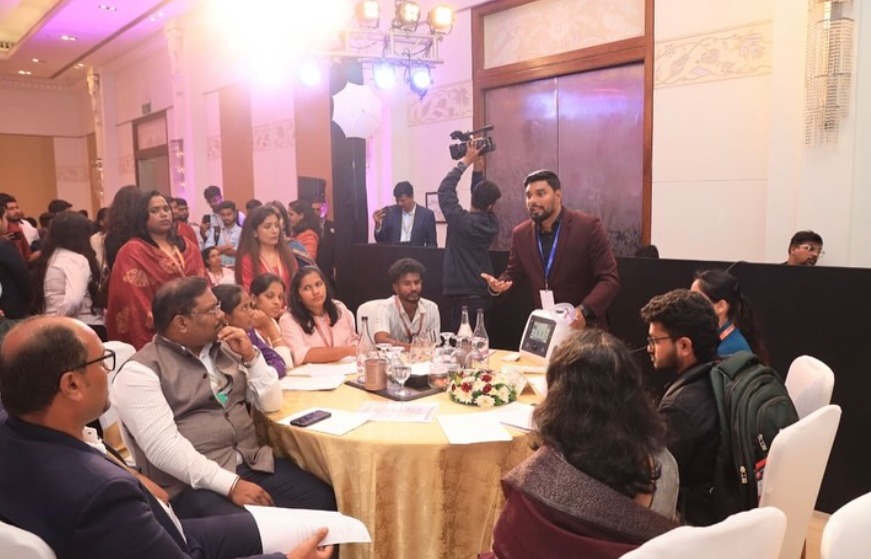
Mr. Mohan Dass G has been honoured as the Resource Person at the Pre-Conference Workshop of the 3rd IAPWC Conference and Physio Manthan National Conference 2025, organized by the Indian Association of Physiotherapist Women’s Cell (IAPWC), where a session on Pediatric Rehabilitation Strategies to Enhance Gross Motor Milestones was conducted.
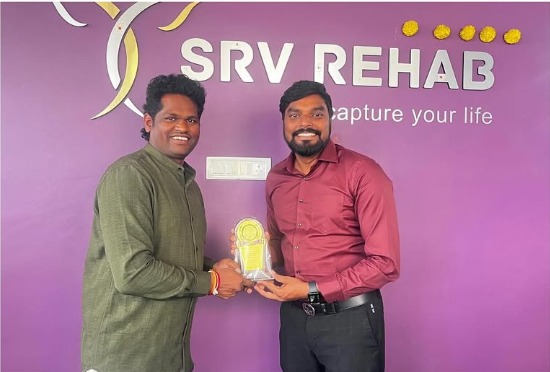
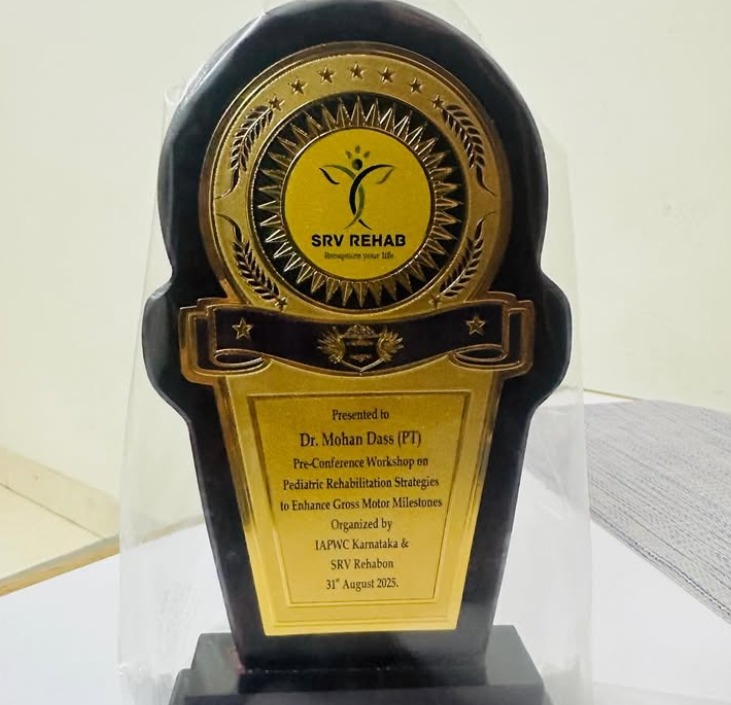
Mr. Mohan Dass G was honoured to serve as a Resource Person at the First Annual National Conference of Pediatric Critical Care Nursing – PediCriticon 2025, where he conducted a workshop on Liberation, Early Awakening, and Activity in PICU (LEAP)
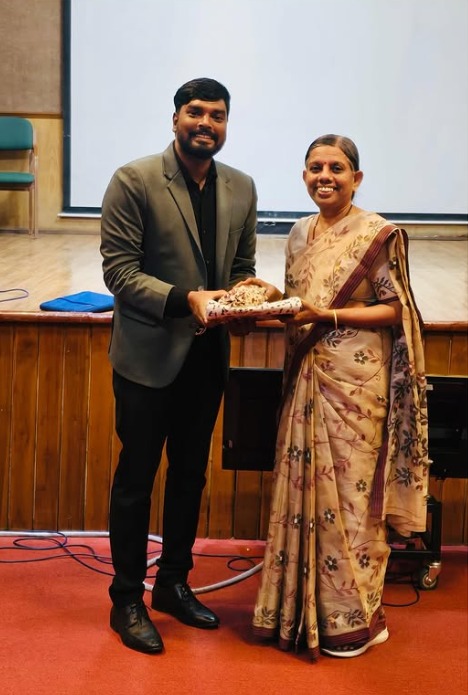
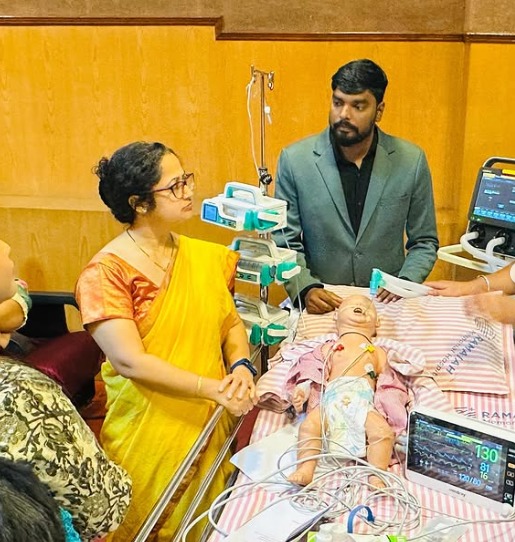
Mr. Mohan Dass G was privileged to be a Resource Person at R.L. Jalappa College of Physiotherapy, Sri Devaraj Urs Academy of Higher Education and Research, where he conducted a session on Clinical-Based Practices & Future Directions in Respiratory Physiotherapy. The workshop highlighted the role of Mechanical Insufflation and Exsufflation Therapy (Cough Assist Therapy) in addressing respiratory complications post-respiratory distress in ICU, critical care, inpatient, and outpatient physiotherapy rehabilitation for both pediatric and adult patients, delivered to Final Year and MPT (Cardio-Pulmonology Sciences) students
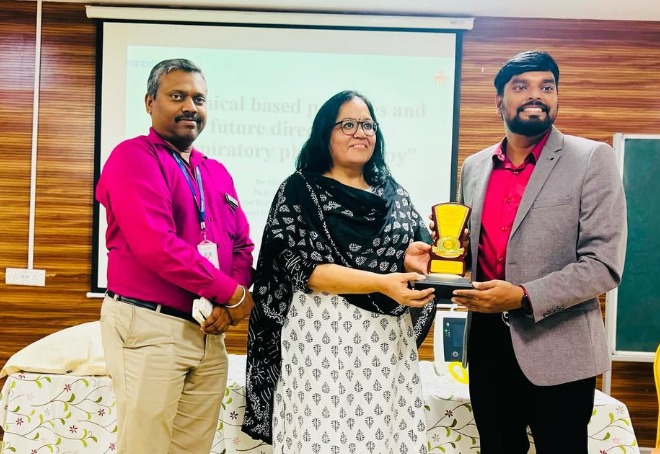
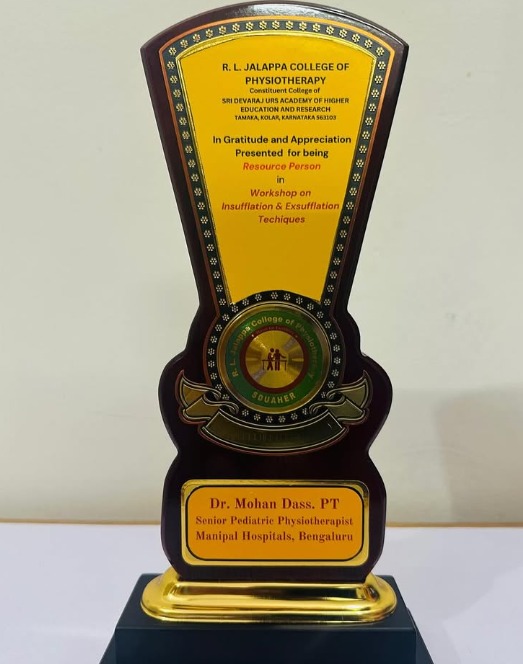
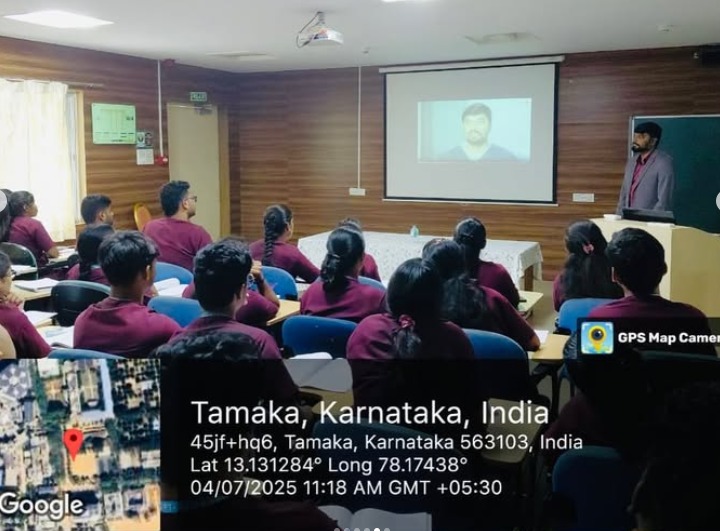
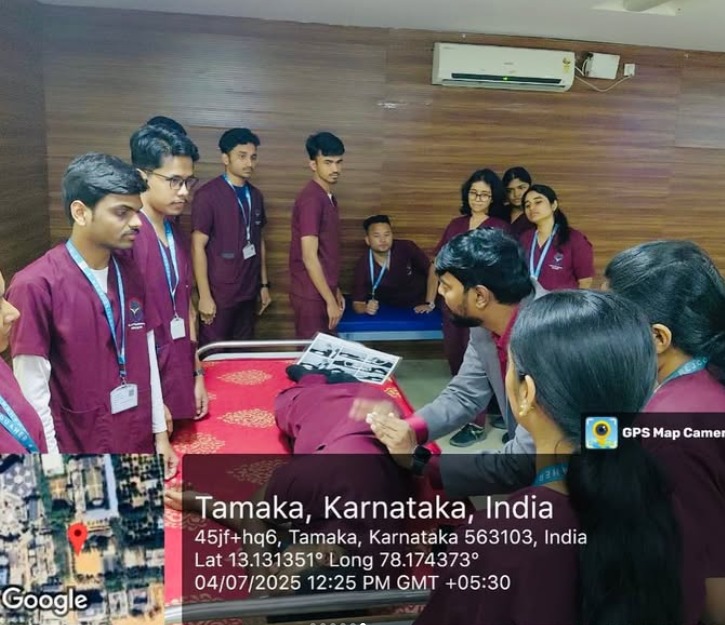
Mr. Mohan Dass G felt greatful to serve as a Judge for the Poster Presentation at KRUPTACON 2025 – International Physiotherapy Conference held at Krupanidhi Institutions. Gratitude is expressed to the organizers for the kind invitation and the wonderful opportunity.
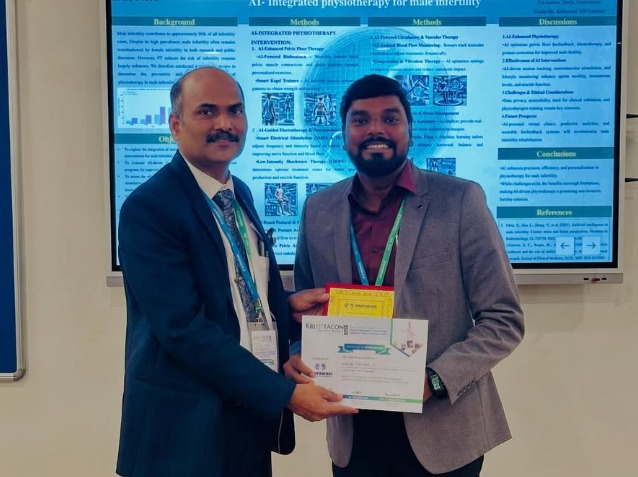
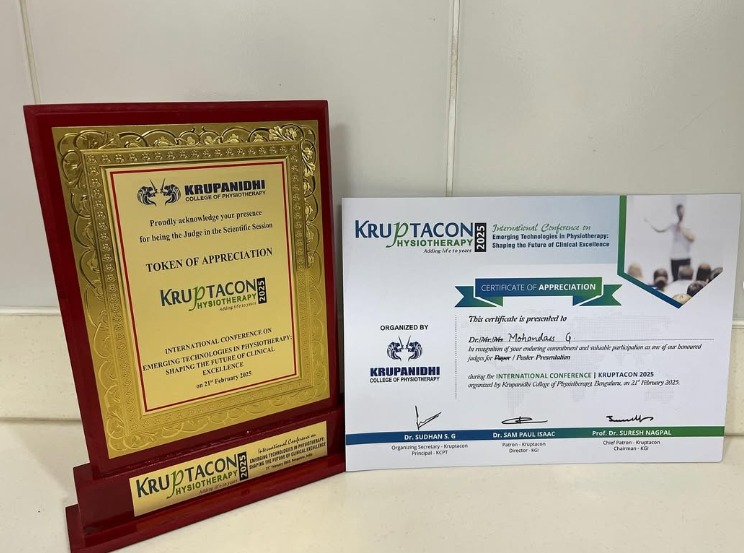
Mr. Mohan Dass G was honoured with a Resource Person memento for conducting a workshop on State-Level Physiotherapy in Critical Care Unit at Sri Devaraj Urs Academy of Higher Education and Research, organized by R.L. Jalappa College of Physiotherapy. The workshop was attended by 60 participants across five batches, including faculty members, clinicians, and students.
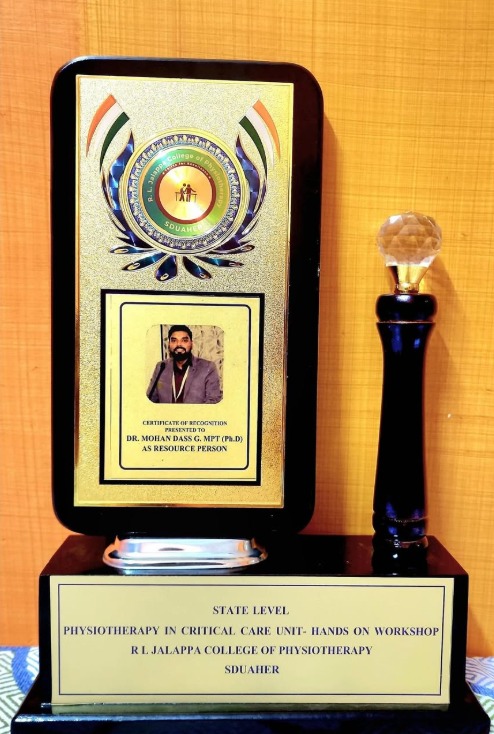
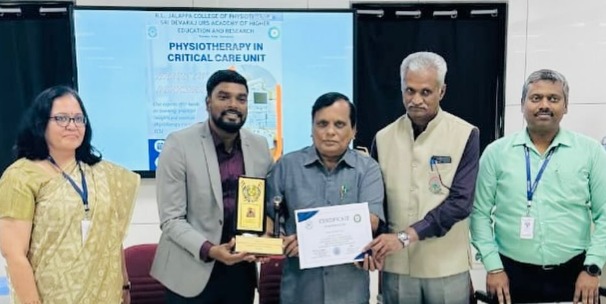
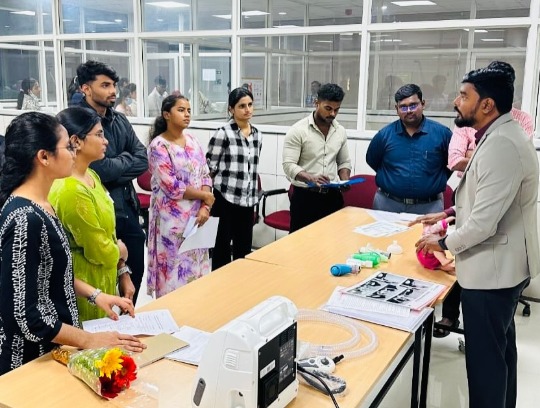
Mr. Mohan Dass G is the first Pediatric Physical Therapist in Bengaluru and South India to hold the DMI Level-C Certification, eligible for the Intensive Model of Therapy (IMOT)
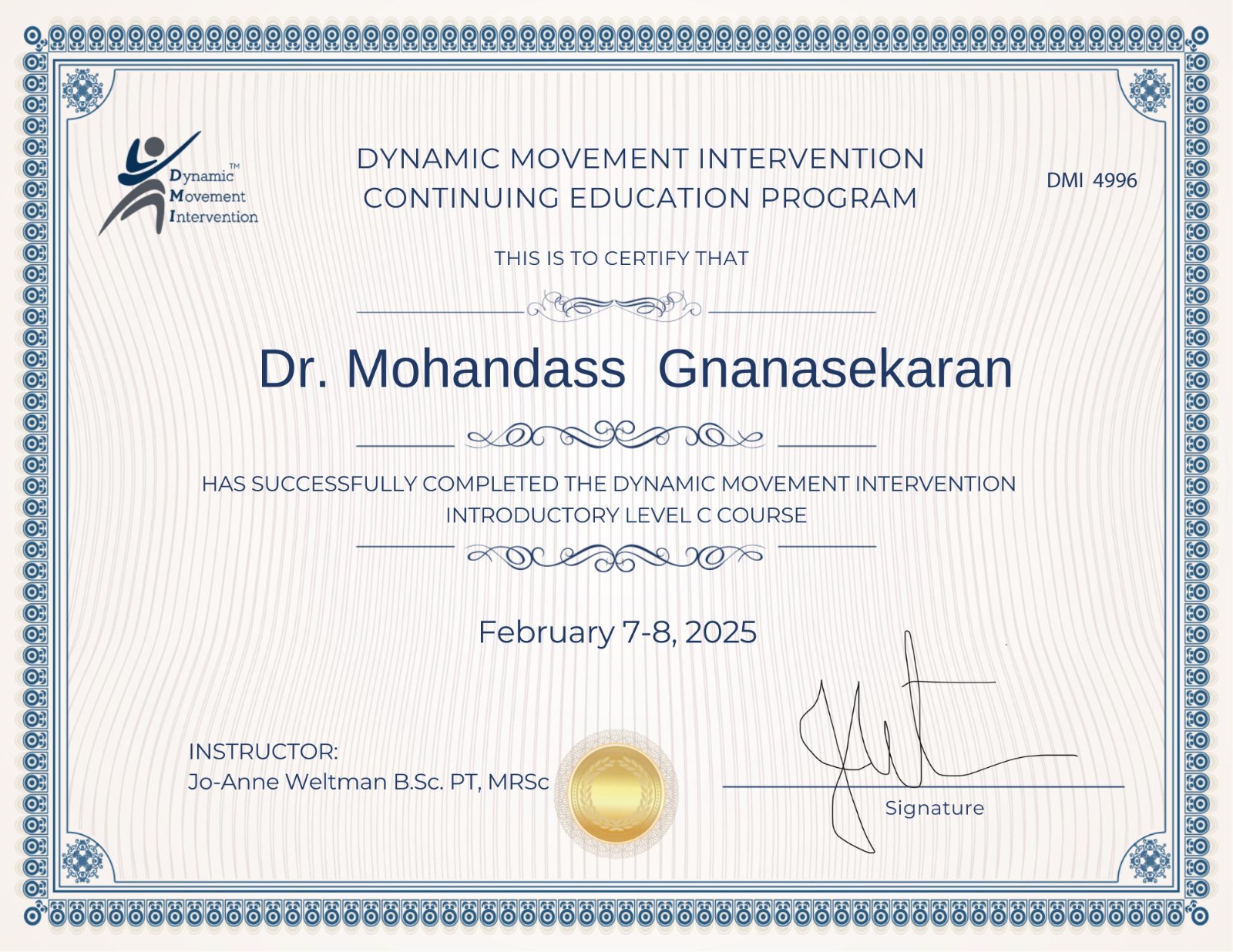
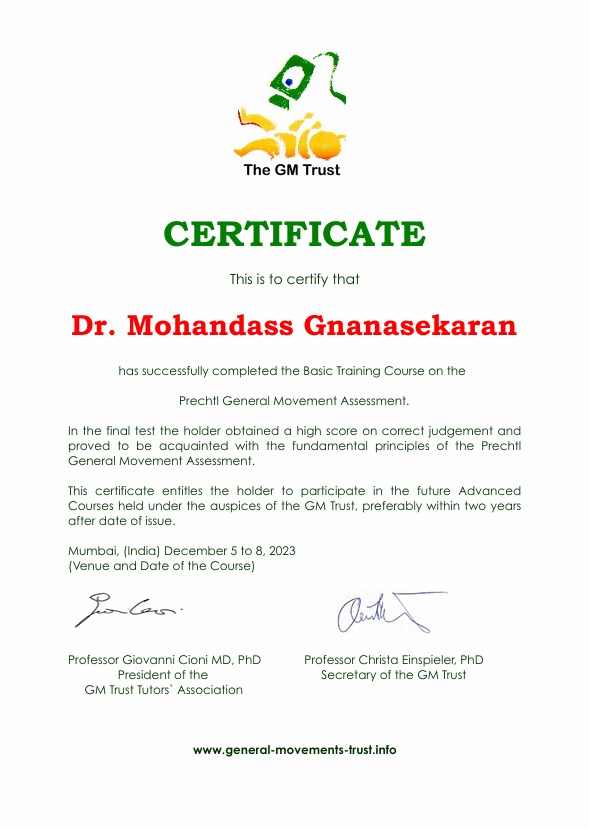
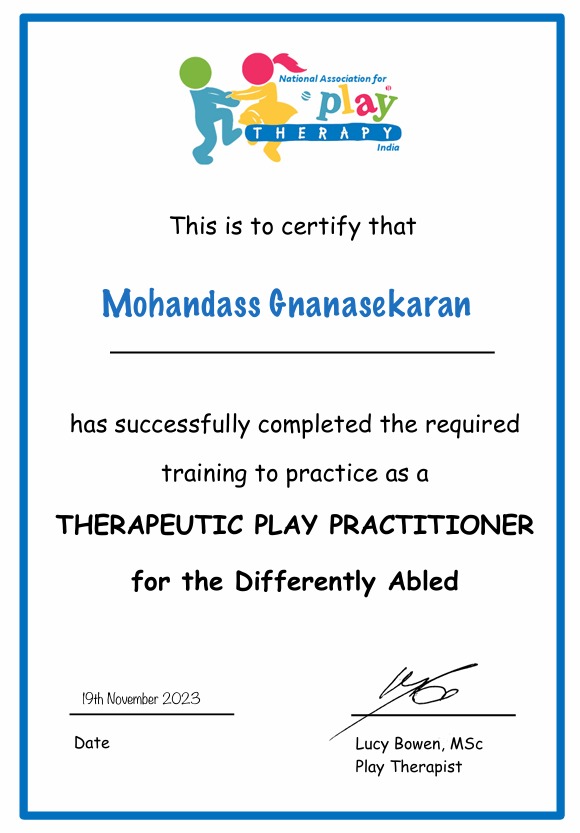
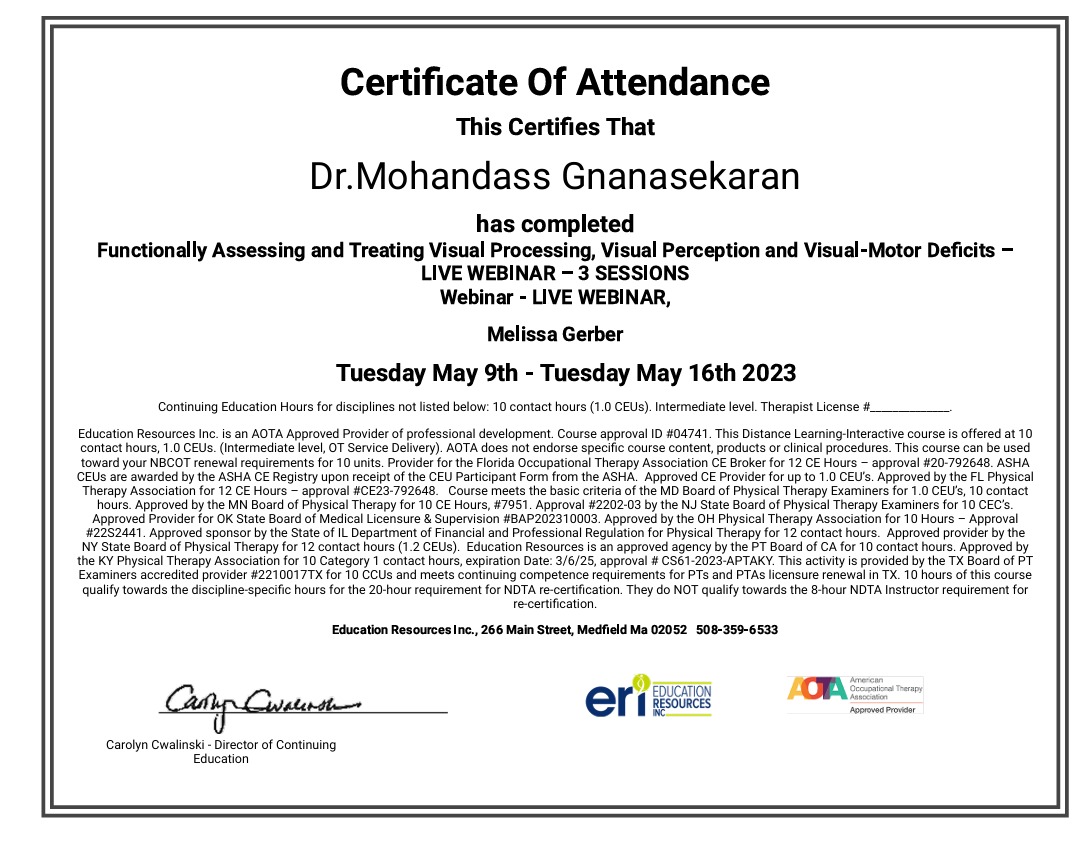
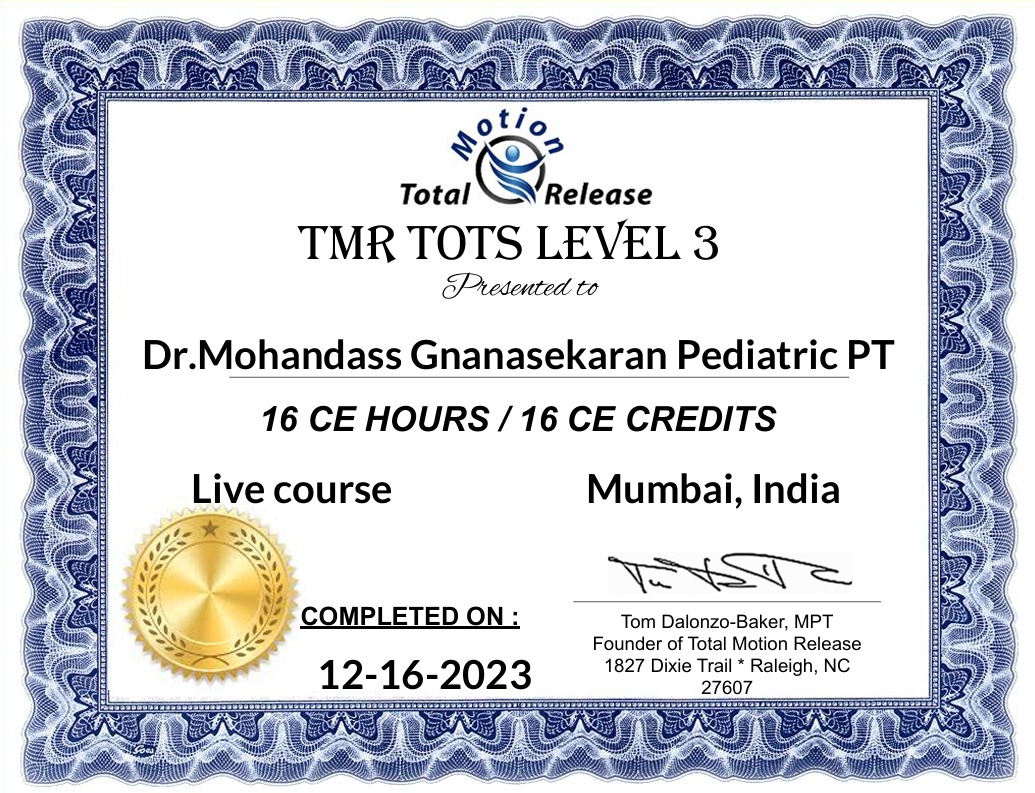
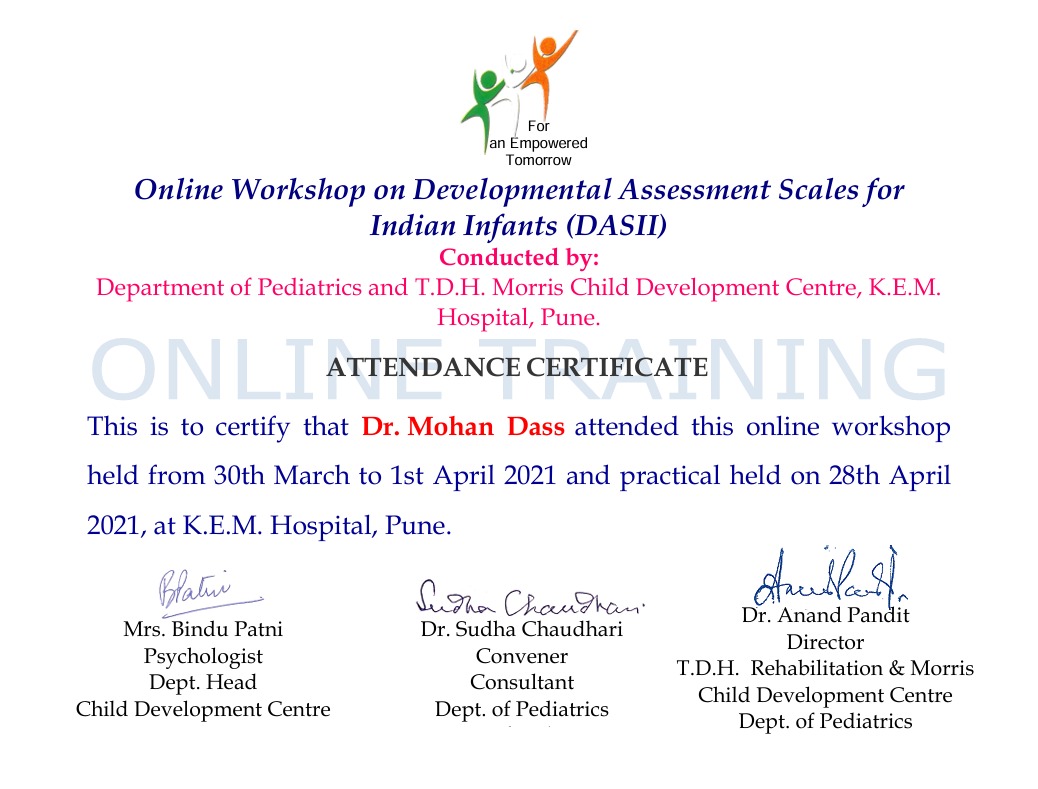
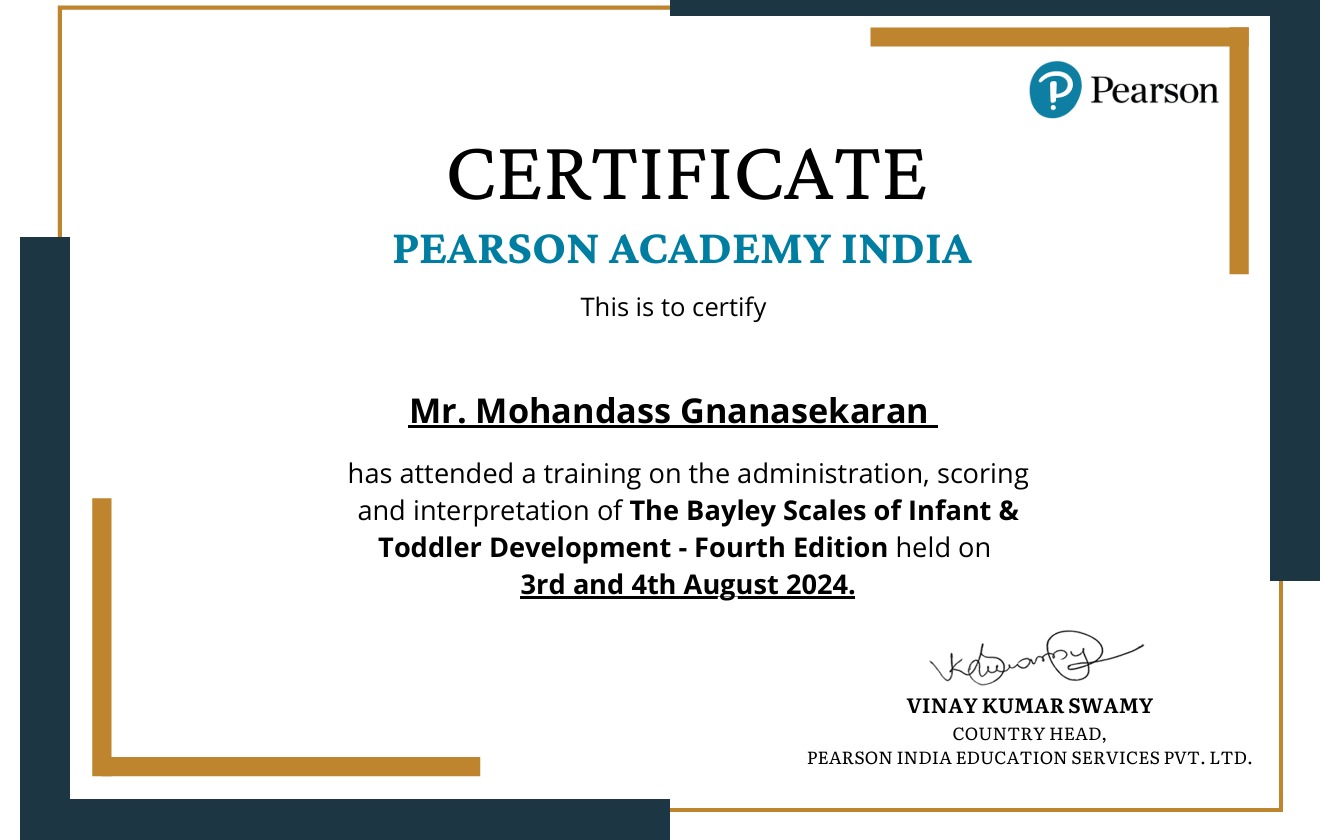
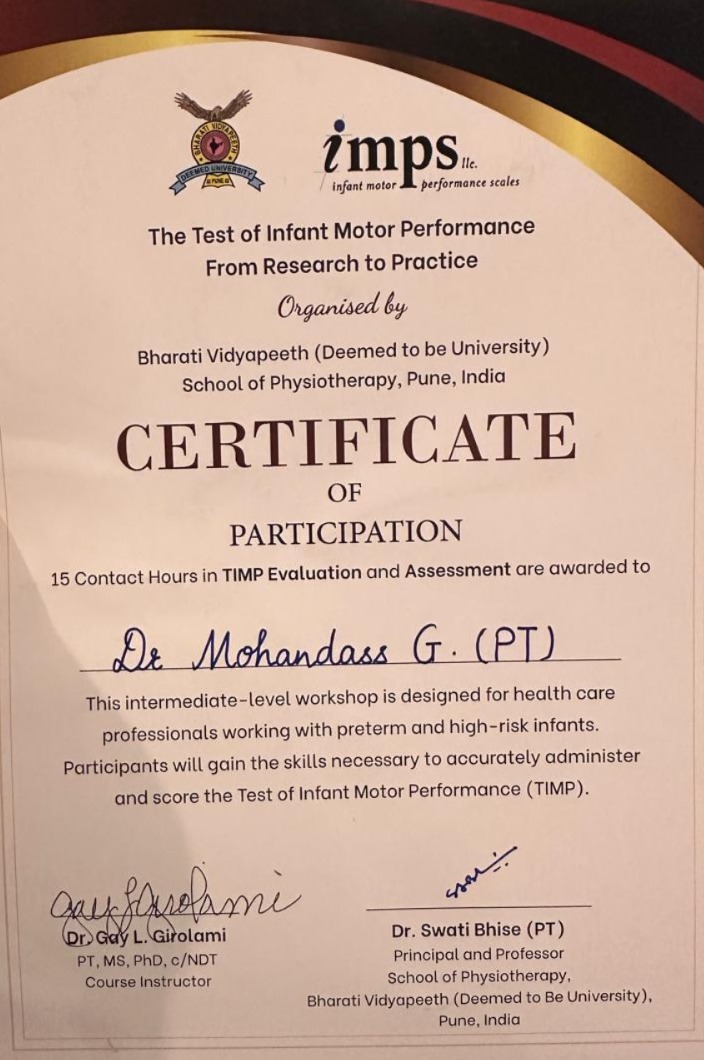
Ph.D. Research Scholar
Master of Physiotherapy (Neurosciences) – SRIHER, Chennai (2017-2019)
Bachelor of Physiotherapy – SRIHER, Chennai (2012-2016)
Certifications
Key developmental assessment skills for high risk infants:
1. Certified “Prechtl’s General Movement Assessment” – Basic level from Professor Christa Einspieler, GM trust, Austria
Non-invasive highly valid assessment to predict the likelihood of adverse neurological outcomes following preterm infants at risk for movement and cognitive developmental milestones from birth to 5 months of age.2. Certified “Test for Infant Motor Performance” from Dr.Gay L., Girolami, Program director physical therapy, University of Illinios , Chicago
The Test of Infant Motor Performance (TIMP) is a motor outcome measure designed to assess posture and selective control of movement in infants; assessing motor function under the age of 4 months.3. Certified “Developmental Assessment Scales for Indian Infants-2” DASII- 2 from, K.E.M. hospital , T.D.H. Morris child development centre, Pune
To assess the Comprehensive developmental profile of the infant from 1 to 30 months of age with respect to mental and motor development.4. Certified “Bayley Scales of Infant and Toddler Development” BSITD- 4 from Dr.Ravi Swamy Neonatologist , Manipal hospitals, Bengaluru
To assess the Comprehensive developmental functioning in the areas of cognition, motor skills, and behaviour of infant and toddler till 48 months.
Key Early Intervention Rehabilitation treatment skills for high risk infants:1. Certified Movement Imitation Therapy for Preterm Birth (MIT-PB) from Professor Christa Einspieler, GM trust, Austria
To facilitate the early neonatal developmental movements and reflex integration thereby enhancing better quality of early birth movements.2. First Certified Practitioner in Bengaluru and South India “Dynamic Movement Intervention (DMI THERAPY)” Introductory Level A, Level B & Level C from DMIT, Ontario ,Canada
To improvise the gross motor development transitions thereby enhancing age appropriate gross movement development in neonates, infants and toddlers.3. First Certified Practitioner in Bengaluru and South India “Total Motion Release – TMR TOTS” ALL LEVELS from Texas Physical Therapy Association (TPTA)
To improvise the posture and alignment; to reduce the tightness and contracture following Neurodevelopmental diversities in infants and toddlers.4. Certified “Functional assessment and treatment for visual processing ,visual perception and visual motor deficits” from American Occupational Therapy Association (AOTA)
To facilitate functional based visual processing following cortical visual impairment in infants and toddler.
Book Appointment
717/1, 16th Main, 6th B Cross Rd, 3rd Block, Koramangala, Bengaluru, Karnataka 560034
- Monday - Saturday
- 05:30 PM - 07:30 PM
Phone: 08050035925
Conditions and Treatments
Mr. Mohan Dass G 's Expert Tips & Health Insights
Articles by Mr. Mohan Dass G
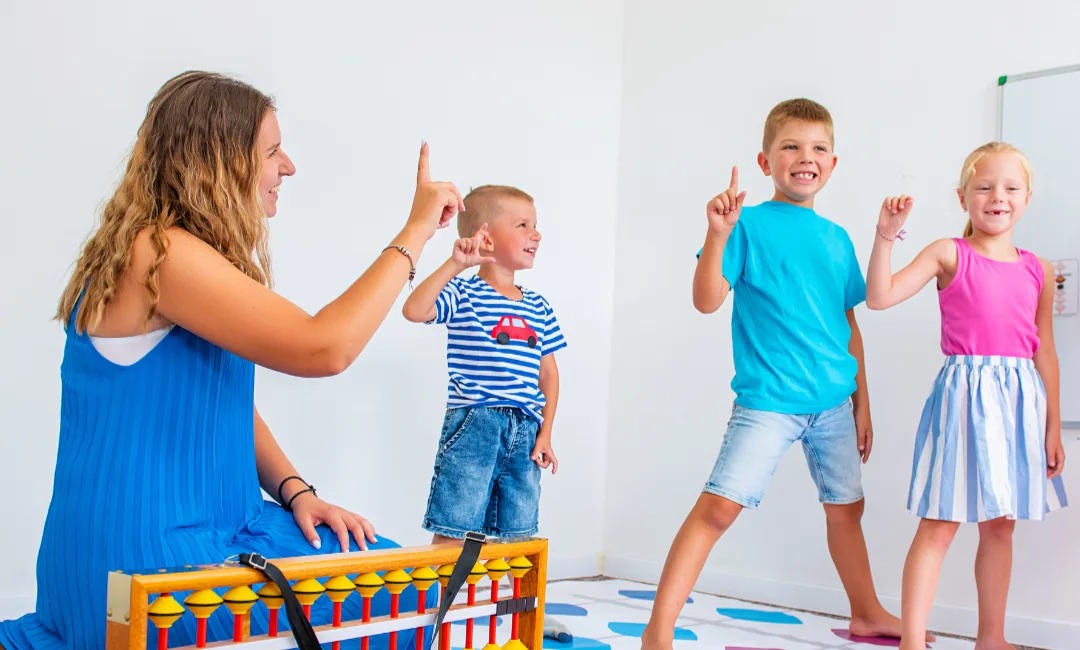
Bridging the Gap: How Pediatric Physiotherapy Supports Learning and Academic Success
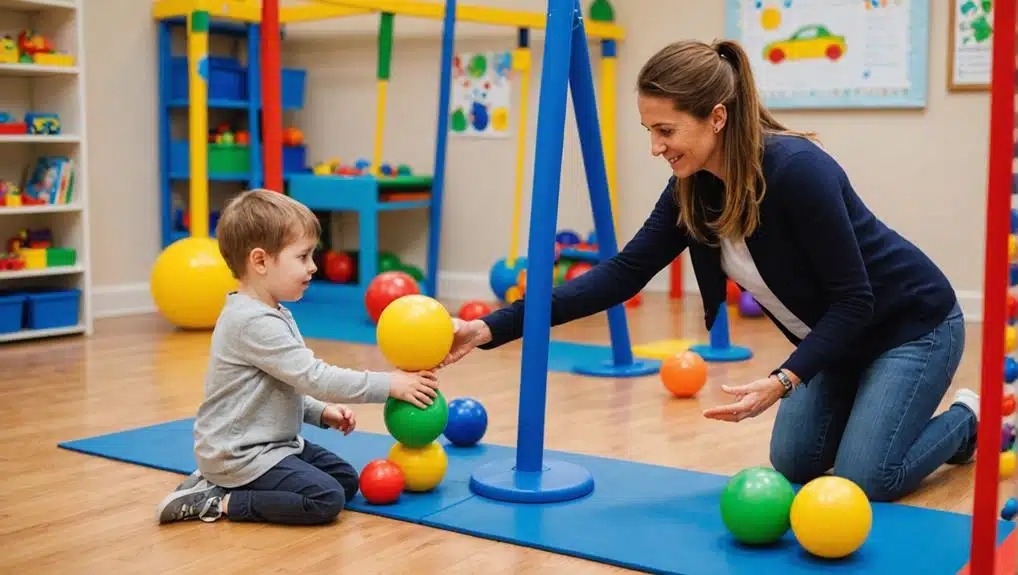
Sensory Integration Therapy for Children with Neurological Disorders: What Parents Need to Know
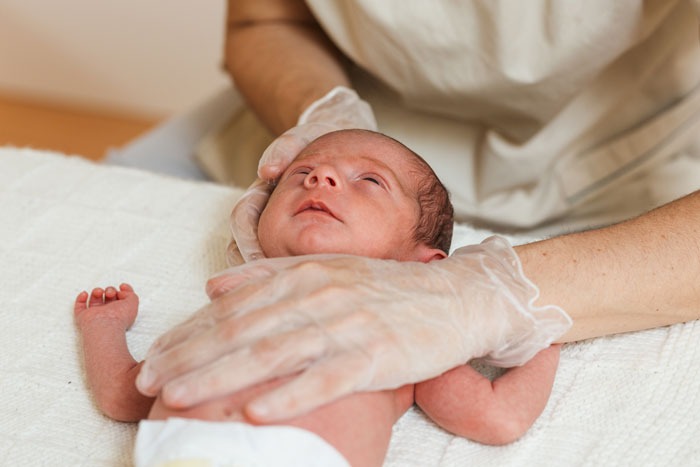
High-Risk Infants: Why Early Physiotherapy Can Transform Long-Term Outcomes
Mr. Mohan Dass G 's Reviews
Mr. Mohan Dass G 's Reviews
Frequently Asked Questions
Frequently Asked Questions
It is a specialized form of therapy aimed at improving motor skills, coordination, strength, and overall development in children.
It supports neural and muscular development, prevents delays, and helps achieve major milestones such as sitting, crawling, and walking.
Early intervention, even in infancy, offers the best outcomes; therapy can be effective at any age depending on the child's needs.
Absolutely—when conducted by trained pediatric physiotherapists using age-appropriate techniques, it is safe and beneficial.
It varies based on the child's condition and goals but typically ranges from a few months to several years.
Yes, it can improve motor skills, sensory regulation, and social participation when tailored to the child's needs.
Sessions are often playful, engaging, and tailored to the child's age and condition, emphasizing skill development.
Ensure the child is medically stable, and discuss any allergies, injuries, or medical concerns with the therapist.
Remain consistent, participate in exercises at home, ask questions, and celebrate small milestones to stay encouraged.
Reach Mr. Mohan Dass G
Copyright © 2025, Linqmd. All rights reserved.
